
 |
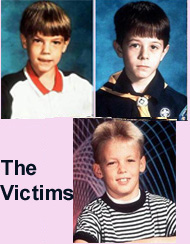 |
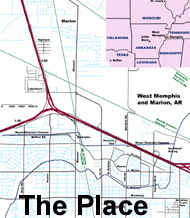 |
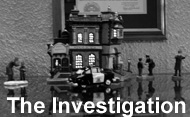 |
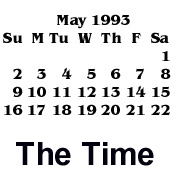 |
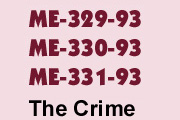 | 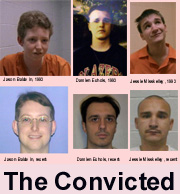 |
 Inappropriate Thought Patterns - from the jury's list of reasons to convict Echols. Echols Versus Ridge, Round Three Distanced demeanor The items on the jury's list that led to Echols conviction can be grouped. Two corresponded to physical evidence - wax and fibers. Several related to Echols integrity including the conclusions that he lied regarding visiting the crime scene, that he lied during his testimony and the general determination, "dishonest." Others are related to his character: "wierd," "manipulative," and the cryptic "inappropriate thought patterns." Perhaps his personality and behavior were as responsible as anything else for him being found guilty. Among the unforgettable moments in the Paradise Lost documentary are those depicting the demeanor of the defendants while on trial: Jessie Misskelley, balled up, head tucked down; Jason Baldwin, wide-eyed as though his foot was snagged on a railway track as an oncoming train approached; Damien Echols, appearing to be in another world, detached from the concept that his life was on the line. Ridge described his encounter with Echols this way: Damien
was very calm and even cold as he answered the questions concerning his
background and any knowledge he may have had concerning the homicide. [Echols interview summary,
May 10, 1993, Detective Ridge]
Referring to Echols composure during his testimony, Davis echoed this sentiment in his closing. And so it went
through and he reeled off a number of things and he kept saying - just
looking real flat, unemotional. . . [Davis closing arguments,
Echols/Baldwin trial]
A very large note guided the jury during their deliberations: 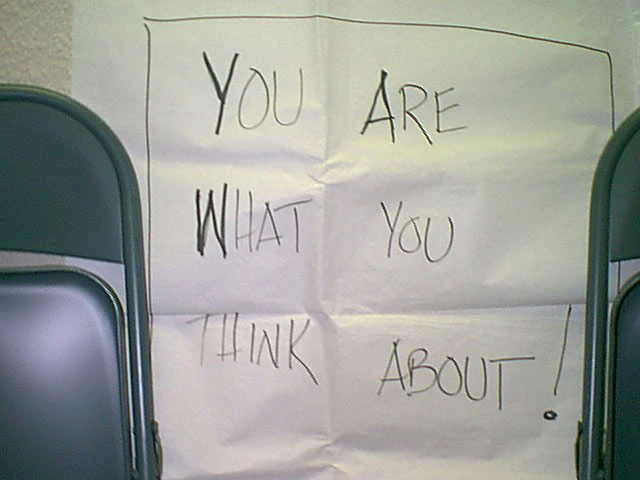 You Are What You Think About! The Mind of the Killer Several of Ridge's notes referred to how Echols imagined the crime and criminal. It would be one perpretrator. Damien
stated that he felt that it was probably one person because if it were
more than one person somebody would probably tell about it sooner or
later. He said that there would be a fear of squealing by one of the
person in the act if it were more than one person. [Echols interview summary,
May 10, 1993, Detective Ridge]
The killer probably lured the kids into the woods and could handle them because they were vulnerable: small and "not smart." Damien
stated that he figured that the killer knew the kids went into the
woods and even asked them to come out to the woods. He stated that the
boys were not big, not smart, and they would have been easy to control.
[ibid]
The woods being near the interstate would drown out the screaming. He
also felt the killer would not have been worried about the boys
screaming due to it being in the woods and close to the expressway.
[ibid]
Echols described the mind of the killer. When
asked about how he thought the person felt that had done the homicides,
he stated that the person probably felt good about what he had done and
that he felt good that he had the power to do what he had done.
[snip]
When asked what he thought the person who killed the
boys was feeling now, Damien stated that the person probably thought it
was funny and that he didn’t care whether or not he got
caught.
[ibid]
Davis grilled Echols on these pronouncements. Davis:
Question number 11, "How do you think the person feels that did this?"
The answer was, "Probably makes them feel good, gives them power." Now,
I guess Officer Ridge said that, too?
Echols: No, I used common sense on that. If someone was doing it, then they must have wanted to. And if they were doing something they wanted to, it must have made them happy. I don't think they were doing it because someone forced them to or because they didn't want to. Davis: So in your mind the person that killed these three kids, it is common sense that killing three eight-year-olds would make you feel good? Echols: Whoever did it, it must have. Davis: Okay. And it gives them power. That's also another common sense perspective from you? Echols: Pretty much. [snip] Davis: You told the officer -- was that -- you told him you thought the person who did it would think it was funny? Echols: Yes. Davis: And would not care one way or the other if he got caught? Echols: Probably not. [Echols testimony, Echols/Baldwin trial] The words "common sense" would come back to haunt Echols. Davis:
And did you also tell him that the killer would probably want to hear
the kids screaming?
Echols: If he got off on killing people, he probably would like to hear them scream. Davis: Those were your words, though, right? Echols: Right. Davis: And is that also part of the common sense that whoever kills eight-year-olds can feel good and whoever kills eight-year-olds would like to hear them scream, is that part of your common-sense philosophy? Echols: I figured they must have if they did it. [ibid] Although Echols had only used the phrase "common sense" twice, Davis sunk his teeth in to this phrase in his summary. Two times became "reeled off a number of things," the murderer "probably thought it was funny" became "probably laughing at police." When
Damien was telling us - remember about the interview? And
he's
talking about what Officer Ridge asked him. And he said--you
know, I
asked him--I said Damien, you know--'you told the officer that whoever
did it is probably laughing at the police'. 'Yeah I said that'. 'Why
you think that?' 'Common sense would tell you that.' And I
thought at
that time that that's a tad strange--now to me, common sense--but maybe
I just--I hadn't thought about it, and then he started reeling off
these things like the person--it would have happened out in the woods
because they couldn't hear them scream. But the person who did would
have really liked to have heard them scream, really enjoy hearing them
scream. Why you think that? Well common sense would
tell you
that. And I thought, well, ok. And so it went through and he
reeled off a number of things and he kept saying - just looking real
flat, unemotional -common sense would tell you that. [Davis closing arguments,
Echols/Baldwin trial]
Echols comments were equated with his mind being the same as the one he described. And I
know when I got home that night it started--when we're dealing with
somebody, whoever committed this crime has to be one warped individual,
and the person who talks in terms of--the person who did this would
like to heard them scream, the person who did this wouldn't mind if
they got caught. And that is a mind, you know, that is a frame of mind
that fits the person who committed this crime. [ibid]
Medications and Mental Health Ridge made this note regarding Echols' medications. Damien
mentioned that he thought that it was scary that we were doing
psychological profiles and that he was on an antidepressant that he
said was amipromin. [Echols interview summary,
May 10, 1993, Detective Ridge]
The defense didn't bring up his medications, but they did use his manic depression to explain some of his writings. Price: Do you remember what - when it was you wrote that in particular or particularly why it was you wrote that?
In
cross-examination, the prosecution suggested his medication made him
calm and problems with his medication may have led to violence. Echols: Most of these I wrote around the same time period. Most of them were when I was going through one of my manic depressive phases. [Echols testimony, Echols/Baldwin trial] Davis: What type of medication are you taking?
Echols: I'm on imipramine. It's for manic depression. Davis: Does it have a calming effect? Does it sedate you to some extent? Echols: Makes you sleepy. Davis: You're on that medication today, is that right? Echols: Yes. [ibid] This led to a long series of exchanges and objections. The prosecution presented a variety of violent actions from Echols past. The defense argued they were distant in the past and irrelevant to judging the matter at hand. Davis:
Your Honor, I think it is important that the jury realize that the
demeanor of the person they see on the witness stand is the demeanor of
a person that is under medication and that his demeanor while not on
that medication can change. Whether or not he was on medication on May
the 5th is a fact issue for the jury to determine.
Burnett: I am going to allow you to inquire into the medication, how his conduct may alter when he is not on it. [snip] Davis: The question I have is if he gets on the witness stand and says, "I am no different when I am off my medication than when I am on it." Burnett: Then perhaps you might be able to impeach him with that. So, I mean, it just depends on how it develops whether I will allow that. Right now, I am not going to allow it [ibid, cross examination] Echols testified to the effects of imipramine. Davis: And it has a calming or relaxing affect on you, correct?
Echols: It makes me sleepy. Davis: Okay. And it keeps you calm, true? Echols: I can't tell that I am any calmer whenever I take it. I just go to sleep real easy. Davis: What do you take that for? Echols: Depression. Davis: Okay. Are you a manic depressive? Echols: Yes, I am. [snip] Davis: When you are in a manic phase. A manic depressive is somebody who has big highs and big lows, right? Echols: Yeah. Davis: Tell us about the big highs. Is that where you feel nearly invincible? Echols: Yeah. [snip, question and answer repeated] Davis: And that's what you get when your medication gets out of level, right? Echols: Right. Davis: And you get that feeling that you are invincible, that there's nothing you can't accomplish, correct? Echols: Right. Davis: Now, has that condition, did that lead to the incident when you were in school where you attacked the the boy and tried to claw his eyes out? Price : Objection, your Honor. [ibid] The prosecution argued that it was reasonable to bring up Echols prior violent behavior because the defense had gone on ". . .ad nauseum about this yesterday telling us what a peaceful individual he was, how he was motivated only by good intentions and his character and things of that nature." [ibid] Burnett: And you are just saying that it is being offered to rebut the peaceable character of the defendant?
Davis: Nice guy that the defendant said he was yesterday, the nonviolent, the peace-lover that wouldn't engage in anything that was violent, would never be involved in any -- Davidson: That testimony didn't come out, your Honor. Davis: It sure did. He said, "Gosh, I wouldn't be involved. In fact, I think, I saw it on TV last night. I wouldn't be involved in a human sacrifice. I am a Wiccan. I am a white witch. I don't do anything, not in violence." [ibid] Echols attorney, Davidson said they hadn't argued character - and they hadn't. Burnett allowed the line of questioning about the effects of the medication and after several objections, allowed some testimony about prior violent behaviors. Burnett:
I am going to allow you to ask that particularly when he has testified
that he is on the mood altering course of medication. I am going
to allow him to ask if you don't take medication, do you have mood
swings where you feel like you are God or whatever and where you get
angry and violent.
[snip] Burnett: I am going to allow you to cross-examine him as to his mood swing and his violence, if he has any. But I want you to avoid specific incidents of conduct unless it is in close proximity of the date of the crime. Price: This is not within -- it's over a year old, Judge, is not close proximity. Burnett: I am suggesting that maybe you don't go into the specific incidents of conduct. [bench conference, Echols testimony, Echols/Baldwin trial] They returned to open court. Davis:
Mr. Echols, when you have these mood swings and your medication is out
of balance, do you have, do you get violent sometimes?
Echols: Only toward myself. Davis: So you are telling us that these mood swings that occur, you don't get violent toward other people? Echols: It just makes me suicidal. Davis: So your acts of violence toward other people have been the result not of any medication but just, just out of anger? Echols: My medication doesn't affect how I deal with other people. Davis: The incident in Oregon, you had an altercation with your father out there is why you came back before they did, right? Price: Your Honor, again we object. The Court just ruled within close proximity. This is not within close proximity. We object, and we want you to admonish the prosecutor he cannot get into this line of questioning. You just ruled within close proximity. [Echols testimony, Echols/Baldwin trial] He then testified about the incidents in Oregon. The prosecution was unable to get Echols to admit to problems of behavior when his medication was off. Davis: Okay. And it was during this time period, was this a time period when your medication was out of balance?
Echols: No. Davis: Okay. So you did these things when your medication was normal? Echols: I had been drinking that night. [ibid] In his closing, Fogleman suggested it was Echols bipolar disease that led to his confessing in front of the softball girls. Well remember when Mr. Davis was examining him about this
manic-depressive situation? And in the manic phase you feel invincible?
Nobody can touch you? I submit, ladies and gentlemen that in that manic
phase - feeling invincible, he didn't care what he said. [Fogleman, closing arguments, Echols/Baldwin trial]
Point of View The
tattoos, he testified he used a razor blade dipped in ink and tattooed
a pentagram on his chest, an Egyptian ankh on his chest, I believe it
was a cross on his hand - upside down depending on how you hold your
hand.
[Fogleman, closing arguments, Echols/Baldwin trial]
Price:
In some of the items that you've read, is there a difference between a
pentagram with the point up and a pentagram with the point down?
Echols: The one that points up is from the Wicca religion. The one that points down is from Satanism. (The pentagram on his chest pointed up.) [Echols testimony, Echols/Baldwin trial] Perhaps the key to understanding the case against Echols was Fogleman's statement that the tattooed cross on Echols hand was upside down - depending on how he held his hand. Evidence that was benign could become sinister - if you chose it to be. Damien's poem "In the Middle" was recited, in whole, by Fogleman and interpreted as the expression of someone who could choose to be Satanic when he wanted. In the
Middle
I want to be in the
middle, in neither the black nor the white-- in neither the wrong nor the right. To stand right on the line. To be able to go to either side with a moment's notice. I've always been in the black, and in the wrong. I tried to get into the white, but I almost destroyed it because the black tried to follow me. This time I won't let it. I will be in the middle. [Fogleman quoting Echols poem during his closing argument, Echols/Baldwin trial] That
right there tells you Damien Echols. He don't want to be in
the
white. He don't want to be good. He wants to be both, where
he
can go to the good side or the bad side, however it suits his
purpose. If he wants to do bad, let's goes to the satanic
side.
If he wants to be good, he goes to the Wiccan side.
[ibid, continuing
above]
The defense presented other portions of Echols dark passages in a less hysterical light. Price:
I notice on the inside of the front cover there appears to be a couple
quotes there. Could you read each of those to the jury and tell them
where they came from?
Echols: "Life is but a walking shadow. It is a tale told by an idiot, full of sound and fury, signifying nothing." That's from "A Midsummer Night's Dream" by William Shakespeare.* "Pure black looking clear my work is soon done here. Try getting back from me that which used to be." That is off a Metallica Tape called "...Injustice For All" - talks about how warped the court systems are, stuff like that. The other one is from "The Twilight Zone" - "I've kicked open a lot of doors in my time, and I am willing to wait for this one to open, and when it does, I'll be waiting." [Echols testimony, Echols/Baldwin trial] (*This quote is from Macbeth.) A poster from his room which had become an exhibit for the prosecution was from a skateboard magazine. Price: In
addition, the State has introduced State's Exhibit number 111. A
photograph - it looks like a - tell the jury what that is.
Echols: It's a picture by an artist called Pusshead, it's by the name he goes by and this was published in "Thrasher" magazine. It's a skateboarding magazine that I used to buy all the time when I used to skateboard. Price: Did that, other than that being a picture, did that have any type of religious significance or cult significance or anything of that nature? Echols: No. Price: OK. Now I'd like to show you this document here that has been introduced as State's Exhibit 110. Wanna take a look at that. And are you familiar with that booklet? Echols: Yes, I am. Price: And tell the ladies and gentlemen of the jury what that booklet is. Echols: This book is, um, is different parts from books that were published all in different books, and I took little parts from each one and copied them down into this one. Price: I notice one of the things - it looks like - it appears to be some kind of cure for worms? Echols: mm-hmm [yes] Price: Was that - do you recall what book you got that out of or where that came from? Echols: I think it was on something during the Salem persecution era. [ibid] Although Crowley was cited by the jury in the reasons for finding Echols guilty, no evidence was presented that Echols had ever read Crowley - beyond the fact Echols had written his name in code. No evidence was presented that Echols had ever read LaVey - beyond Ridge's testimony. Echols had denied reading either. Griffis testified that Crowley promoted human sacrifice -- the younger the victim the better. This assertion comes from the passage: But
the bloody sacrifice, though more dangerous, is more efficacious; and
for nearly all purposes human sacrifice is the best. [snip] For the
highest spiritual working one must accordingly choose that victim which
contains the greatest and purest force. A male child of perfect
innocence and high intelligence is the most satisfactory and suitable
victim. [Aleister
Crowley, Magick In Theory And Practice]
Further down on the same page this is explained. It is
the sacrifice of oneself spiritually. And the intelligence and
innocence of that male child are the perfect understanding of the
Magician, his one aim, without lust of result. And male he must be,
because what he sacrifices is not the material blood, but his creative
power. [ibid]
When taken out of context, the most violent book Echols read would have been the Bible. Here, the slaying of humans is common and approved of or initiated by God. Forty two children are attacked by bears in response to the children mocking Elisha. And he
[Elisha] went up from thence unto Bethel: and as he was going
up
by the way, there came forth little children out of the city, and
mocked him, and said unto him, Go up, thou bald head; go up, thou bald
head. And he turned back, and looked on them, and cursed them
in
the name of the Lord. And there came forth two she bears out
of
the wood, and tare forty and two children of them. [2 Kings 2:23-24, King James Version (KJV)]
The Lord promised to send Israel's enemies into a frenzy of cannibalism. And I
[the Lord] will cause them to eat the flesh of their sons and the flesh
of their daughters, and they shall eat every one the flesh of his
friend in the siege and straitness, wherewith their enemies, and they
that seek their lives, shall straiten them. [Jeremiah 19:9, KJV]
And, of course, the relevant, Thou shalt not suffer a witch to
live. [Exodus
22:18, KJV]
Such isolated quotes can make the Biblical God appear cruel or petty. To use them as evidence for convicting someone who owned or read a Bible would be nonsensical. Echols was convicted in part for "Inappropriate Thought Patterns." Some of this was due to the exaggerated meanings and associations given to innocuous evidence which were no more than the typical accumulation of morbid thoughts of most teens. Much of it came from Detective Ridge's notes and testimony of his interview. Echols stated that Ridge had put words in his mouth or simply lied. The prosecutor dismissed such notions while at the same time they put words in Echols mouth, claiming he said two of the children had drowned or that Echols had claimed it was common sense that the perpetrator would be laughing at the police. In interviews where Ridge had both notes and a tape recording, his notes could be compared to the subject's words. And in these cases, Ridge's notes often added details either not in the recordings or that were directly contradicted by what was in the recordings. This phenomenon has been noted on several of the pages of this website, particularly in "Exhibit B of the Search Warrant" and Ridge's involvement in the Search for the Cult. When presenting to the judge the evidence for the warrants, Ridge claimed. Fogleman:
Alright, and did Jessie Misskelley uh, tell you which victim had these
types of wounds?
Ridge: Yes sir, he did. He told us that is was Steven Branch that received the cuts to the face. [Probable cause hearing, June 3, 1993] Such a detail would have been very specific. Misskelley made no such statement on the recordings and it did not appear in Gitchell's or Ridge's notes. Ridge claimed Misskelly
also described the area where the murders occurred very specifically as
to the high bank on the west side of the ditch where the bodies were
placed and the flat area on the east side of the ditch where the
murders actually took place. [Exhibit B, search warrant]
On the recording, it was Ridge who made the detailed description of the crime scene, literally putting words into Misskelley's mouth by insisting on correcting him. Alright, and you know where the
little creek is
that goes out to the expressway, and it doesn't have a lot of water in
it, but it's got some water in it, and it's flowing through there. . . [snip] Alright,
we're going to correct that even
further, that's the east side, Memphis side is the east side and you
were standing at the top of the bank on the west side. . . [Detective Ridge, Misskelley
June 3rd statement]
When interviewing Ricky Climer, Ridge asked about the cult members ritual of eating pet meat. Ridge:
What I'm trying to say, was there a reason that they would eat this
meat or reasons that they would do certain things, was it suppose to
give somebody power or was it just
Climer: I guess you would say, it like uh, you know, let us eat this meat, you know right here, they would eat it, and they start feeling real good and everything. [Ricky Climer interview, June 16, 1993] Ridge's question was whether they ate the meat for power. Climer said it was to feel good. Ridge's notes summarized the response to include his own suppositions. "He stated they would eat a piece of meat and say how powerful they felt at which time everyone in the group would start eating it." [Ridge notes, Ricky Climer interview] Ridge invented accounts that were not justified by the tape recordings. And the only way to have known this was by having the recordings. This potential method of impeaching his credibility was not available to Echols. In spite of his history of lying and putting words into mouths, Ridge won the battle of Echols versus Ridge. |
![]()
|
Copyright
© 2008 Martin
David Hill
|
|
Site
Design By Michael
Gillen
|